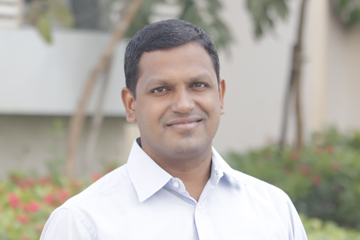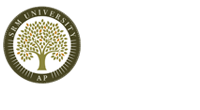The Department of Management, Paari School of Business is proud to present to you the BBA programme. In line with the National Education Policy (NEP) 2020, it is a three year programme (BBA), with the fourth year being optional (BBA Hons).
Our programme is not just in line with NEP 2020, it also has several unique aspects; we have a different yet relevant programme. Our programme highlights are:
- Marketing
- Finance
- Human Resource Management
- Operations
- Business Analytics
- Entrepreneurship & Family Business
In addition, we have state-of-the-art infrastructure and thriving out of class activity (e.g. clubs and committees, our B School Fest, sports facilities that are world-class, fun activities with classmates and counterparts from other schools on festival days/events). Our programme supports all three graduating outcomes:
- Higher Studies: Through courses like Research Study, the optional 4th year and counselling from the Directorate of International Relations and Higher Studies, numerous opportunities for students’ CV building, well-respected faculty whose Letters of Recommendation would have an impact.
- Entrepreneurship: Entrepreneurial Mindset is a core course. In addition, we offer a specialisation in Entrepreneurship & Family Business. Finally, we have a Directorate of Entrepreneurship and Innovation that will help students realise their entrepreneurial dreams.
- Placement: Our unique curriculum makes students placement ready; students’ skills are not just honed by our curriculum but also through placement training offered by specialised vendors.
A BBA student at SRM AP can hope to gain
Thus, we offer an amalgamation of a unique curriculum, world class faculty & infrastructure, holistic development with a multidisciplinary perspective, industry interaction, support for all three graduating outcomes and much more.
What are you waiting for?
 The Department of Management at Paari School of Business catalyses innovation in education by weaving together courses in Management, Entrepreneurship and Research. Graduate and Post-graduate students in the Department, are imparted with theoretical and practical knowledge which enables them to succeed and have an edge in the competitive world. The students here experience an unparalleled education journey, which prepares them to be a global business leader. Apart from academic learnings, the students get an opportunity to participate in various activities and events all throughout the academic year, which contributes to their holistic development. All the students undergo a summer internship programme, which gives them a chance to explore and experience the corporate work life.
The Department of Management at Paari School of Business catalyses innovation in education by weaving together courses in Management, Entrepreneurship and Research. Graduate and Post-graduate students in the Department, are imparted with theoretical and practical knowledge which enables them to succeed and have an edge in the competitive world. The students here experience an unparalleled education journey, which prepares them to be a global business leader. Apart from academic learnings, the students get an opportunity to participate in various activities and events all throughout the academic year, which contributes to their holistic development. All the students undergo a summer internship programme, which gives them a chance to explore and experience the corporate work life.
The Department provides great prospects to the students and accelerates the career path which he or she wishes to pursue, after graduation. The budding entrepreneurs can develop their ideas under the guidance of Entrepreneurship cell. They are trained to identify and analyse the problem, find alternate solutions, and generate business ideas. Entrepreneurship cell supports the entire process from idea generation to implementation. For a student who wishes to pursue higher studies, the International Relations cell provides them with the right direction and assistance. Apart from this, the students also get an option to apply for a Semester Abroad Programme, International Immersion programmes and other similar initiatives, with top universities across the globe. Corporate Relations and Placement cell teaches the students strategies and framework for personal growth, goal setting and self-improvement and facilitates placement by providing exciting job and internships opportunities.
I welcome you to be a part of this journey at the Department of Management, Paari School of Business!
All the best to you.
- Dr Lalita Mohan Mohapatra
Programmeme Educational Objectives (PEO)
Programme Specific Outcomes (PSO)
Programme Outcomes (PO)
Capable of demonstrating comprehensive knowledge and understanding of one or more disciplines that form a part of an undergraduate program of study.
Ability to evaluate the reliability and relevance of evidence; Capacity to extrapolate from what one has learned and apply their competencies to solve different kinds of non-familiar problems, rather than replicate curriculum content knowledge; and apply one’s learning to real-life situations.
Capability to apply analytic thought to a body of knowledge: analyse and evaluate evidence, arguments, claims, and beliefs based on empirical evidence; identify relevant assumptions or implications; formulate coherent arguments; critically evaluate practices, policies, and theories by following a scientific approach to knowledge development. Critical sensibility to lived experiences, self-awareness, and reflexivity of self and society.
Ability to analyse, interpret and draw conclusions from quantitative/qualitative data and evaluate ideas, evidence and experiences from an open-minded and reasoned perspective about incorporating into a system.
Capability to use ICT in a variety of learning situations; demonstrate the ability to access, evaluate, and use a variety of relevant information sources; and use appropriate software for analysis of data.
Understand the impact of scientific solutions in societal and environmental contexts and demonstrate the knowledge of and need for sustainable development.
Possess knowledge of the values and beliefs of multiple cultures and a global perspective; and capability to effectively engage in a multicultural society and interact respectfully with diverse groups; Ability to embrace. Moral/ethical values in conducting one’s life, formulating a position/argument about an ethical issue from multiple perspectives, and using ethical practices in all work. Capable of demonstrating the ability to identify the ethical problems related to one’s work; avoid unethical behaviour such as fabrication, falsification or misrepresentation of data or committing plagiarism, not adhering to intellectual property rights; appreciating environmental and sustainability issues; and adopting objective, unbiased and truthful actions in all aspects of work.
Ability to work effectively and respectfully with diverse teams: facilitate cooperative or coordinated effort on the part of a group, and act together as a group or a team in the interests of a common cause and work efficiently as a member of a team.
Ability to express thoughts and ideas effectively in writing and orally, communicate with others using appropriate media, confidently share one’s views and express themself; demonstrate the ability to listen carefully, read and write analytically, and present complex information clearly and concisely to different groups.
Capability for mapping out the tasks of a team or an organisation, setting direction, formulating an inspiring vision, building a team that can help achieve the vision, motivating and inspiring team members to engage with that vision, and using management skills to guide people to the correct destination, smoothly and efficiently.
Ability to work independently, identify appropriate resources required for a project and manage a project through to completion; Ability to acquire knowledge and skills, including “learning how to learn”, that is necessary for participating in learning activities throughout life, through self-paced and self-directed learning aimed at personal development, meeting economic, social and cultural objectives, and adapting to changing trades and demands of the workplace through knowledge/skill development/reskilling.


